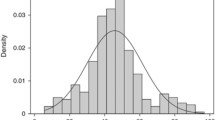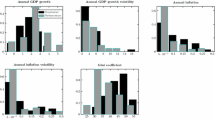Abstract
The results of twenty-five Turkish elections for parliament and local administrations between 1950 and 2004 are studied. Turkish voters are found to take government's economic performance into account but not look back beyond one year. Furthermore, they are found to hold the major incumbent party responsible for both growth and inflation but minor incumbent parties, only for inflation. Also, they appear to vote strategically, especially in local and parliamentary by elections, to diffuse power. Finally, all parties exhibit a steady depreciation in their political capital while in office. These conclusions are essentially in conformity with the literature on other countries.
Similar content being viewed by others
References
Abrams, B. A., & Butkiewicz, J. L. (1995). The influence of State-level Economic Conditions on the 1992 U.S. Presidential Election. Public Choice, 85, 1–10.
Akarca, A. T., & Tansel, A. (2002). Economic Performance and Political Outcomes : An Analysis of the 1995 Turkish Parliamentary Election Results. Paper presented at the 2002 Annual Conference of the Economic Research Forum (ERF) held at Al-Sharjah, United Arab Emirates, and at the 2003 Annual Meeting of the Southwestern Economic Association held at San Antonio, Texas, USA.
Alesina, A., Londregan, J., & Rosenthal, H. (1993). A Model of the Political Economy of the United States. American Political Science Review, 87, 12–33.
Alesina, A., Londregan, J., & Rosenthal, H. (1996). The 1992, 1994 and 1996 Elections: A Comment and a Forecast. Public Choice, 88, 115–125.
Alesina, A., & Rosenthal, H. (1989). Partisan Cycles in Congressional Elections and the Macroeconomy . American Political Science Review, 83, 373–398.
Alesina, A., & Rosenthal, H. (1995). Partisan Politics, Divided Government, and the Economy. Cambridge University Press: New York.
Bacik, G. (2004). The Parliamentary Election in Turkey, November 2002. Electoral Studies, 23, 821–845.
Blackley, P. R., & Shepard III, E. M. (1994). A Statistical Analysis of the Effect ofState-level Economic Conditions on the 1992 Presidential Election. Public Finance Quarterly, 22, 366–382.
Bulutay, T. (1970). Türk Toplumsal Hayatinda İktisadi ve Siyasal Gelişmeler (Economic and Political Developments in Turkish Social Life). SBF Dergisi, 25, 79–119.
Bulutay, T., & Yildirim, N. (1969). Türk Seçmenlerin Oy Verme Eğilimlerinde Iktisadi Sebeplerin üzerinde Bir Deneme (An Essay on Economic Reasons Behind the Voting Tendencies of the Turkish Electorate). SBF Dergisi, 22, 7–39.
Burdekin, R. C. K. (1988). Economic Performance and the Determination of Presidential Elections in the U.S. The American Economist, 32, 71–75.
Chappell, H. W., & Suzuki, M. (1993). Aggregate Vote Functions for the U.S. Presidency, Senate, and House. Journal of Politics, 55, 207–217.
Chappell, H. W., & Veiga, L. G. (2000). Economics and elections in Western Europe: 1960-1997. Electoral Studies, 19, 183–197.
Çakmak, C. (1985). Türkiye'de 1950'li Yillardaki Genel Seçimler üzerine Bir Deneme (An Essay on Elections during the 1950s in Turkey), Middle East Technical University Studies in Development, 12, 245–283.
Çarkoğlu, A. (1997). Macroeconomic Determinants of Electoral Support for Incumbents in Turkey, 1950–1995. New Perspectives on Turkey, 17, 75–96.
Durbin, J. (1970). Testing for Serial Correlation in Least Squares Regression When Some of the Regressors Are Lagged Dependent Variables . Econometrica, 38, 410–421.
Erikson, R. S. (1988). The Puzzle of Midterm Loss. Journal of Politics, 50, 1011–1029.
Erikson, R. S. (1989). Economic Conditions and the Presidential Vote. American Political Science Review, 83, 567–573.
Erikson, R. S. (1990). Economic Conditions and the Congressional Vote : A review of the Macrolevel Evidence. American Journal of Political Science, 34, 373–399.
Fair, R. C. (1978). The Effect of Economic Events on Votes for President. Review of Economics and Statistics, 60, 159–173.
Fair, R. C. (1982). The Effect of Economic Events on Votes for President: 1980 Results. Review of Economics and Statistics, 64, 322–325.
Fair, R. C. (1988). The Effect of Economic Events on Votes for President: 1984 Update. Political Behavior, 10, 168–179.
Fair, R. C. (1996). The Effect of Economic Events on Votes for President: 1992 Update. Political Behavior, 18, 119–139.
Fair, R. C. (2002). The Effect of Economic Events on Votes for President: 2000 Update. Unpublished paper.
Genç, I. H., şahin, H., & Bekmez, S. (2005). Homoeconomical behavior of Turkish Electorate. Southwestern Journal of Economics, 7, 1–24.
Gençkaya, Ö. F. (2000). Siyasi Partilere ve Adaylara Devlet Desteği, Bağişlar ve Seçim Giderlerinin Sinirl&iri lmasi: Karilastirmali Bir Inceleme ve Türkiye Için Bir Öneri (State Support for Political Parties and Candidates, Limitations on Donations and Election Spending: A Comparative Analysis and a Proposal for Turkey). In çarkoğlu, A., Erdem, T., Kabasakal, M., & Gençkaya, Ö. F. (eds), Siyasi Partilerde Reform (Reform in Political Parties), 55–134. TESEV: Istanbul, Turkey.
Gleisner, R. F. (1992). Economic Determinants of Presidential Elections : The Fair model. Political Behavior, 14, 383–394.
Grier, K. B., & McGarrity, J. P. (2002). Presidential Party, Incumbency, and the Effects of Economic Fluctuations on House Elections, 1916–1996. Public Choice, 110, 143–162.
Jacobson, G. C. (1990). Does the Economy Matter in Midterm Elections? American Journal of Political Science, 34, 400–404.
Kiewiet, D. R., & Udell, M. (1998). Twenty-five Years After Kramer : An Assessment of Economic Retrospective Voting Based Upon Improved Estimates of Income and Unemployment . Economics and Politics, 10, 219–248.
Kramer, G. H. (1971). Short-term Fluctuations in U.S. Voting behavior, 1896–1964. American Political Science Review, 65, 131–143.
Lewis-Beck, M. (1988). Economics and Elections: The Major Western Democracies. University of Michigan Press: Ann Arbor, MI.
Lewis-Beck, M. S. (1997). Who's the Chief? Economic Voting Under a Dual Executive. European Journal of Political Research, 31, 315–325.
Lewis-Beck, M. S., & Rice, T. W. (1984a). Forecasting Presidential Elections: A Comparison of Naive Models. Political Behavior, 6, 9–21.
Lewis-Beck, M. S., & Rice, T. W. (1984b). Forecasting U.S. House Elections. Legislative Studies Quarterly, 9, 475–486.
Lewis-Beck, M. S., & Stegmaier, M. (2000). Economic Determinants of Electoral Outcomes . Annual Review of Political Science, 3, 183–219.
Lewis-Beck, M. S., & Tien, C. (1996). The Future in Forecasting: Prospective Presidential Models. American Political Quarterly, 24, 468–491.
Lynch, G. P. (2002). Midterm Elections and Economic Fluctuations: The response of Voters Over Time. Legislative Studies Quarterly, 27, 265–294.
Nannestad, P., & Paldam, M. (1994). The VP Function: A survey of the Literature on Vote and Popularity Functions after 25 Years. Public Choice, 79, 213–245.
Norpoth, H. (1996). The Economy. In LeDuc, L., Niemi, R. G., & Norris P. (Eds), Comparing Democracies: Elections and Voting in Global Perspective. 219–318. Sage: Thousand Oaks, CA.
Pacek, A. C., & Radcliff, B. (1995). Economic Voting and the Welfare State: A Cross-National Analysis. Journal of Politics, 57, 44–61.
Peltzman, S. (1987). Economic Conditions and Gubernatorial elections . American Economic Review, 77, 293–297.
Peltzman, S. (1990). How Efficient is the Voting Market? Journal of Law and Economics, 33, 273–63.
Powell, G. B., & Whitten, G. D. (1993). A Cross-National Analysis of Economic Voting : Taking Account of the Political Context. American Journal of Political Science, 37, 391–414.
Radcliff, B. (1988). Solving a Puzzle: Aggregate Analysis and Economic Voting Revisited. Journal of Politics, 76, 413–434.
Strumpf, K. S., & Phillippe, Jr. J. R. (1999). Estimating Presidential Elections: TheImportance of State Fixed Effects and the Role of National Versus Local Information. Economics and Politics, 11, 33–50.
Tucker, J. A. (2001). Economic Conditions and the Vote for Incumbent Parties in Russia, Poland, Hungary, Slovakia, and the Czech Republic from 1990 to 1996. Post-Soviet Affairs, 17, 309–331.
Tuncer, E. (1996). 24 Aralimathk 1995 Seçimi: Sayimathsal ve Siyasal Değerlendirme (24 December 1995 Election: A Quantitative and Political Evaluation.) TESAV: Ankara, Turkey.
Tuncer, E. (2002). Osmanlimath'dan Günümüze Seçimler: 1877–1999 (Elections From the Ottomans to the Present: 1877–1999). TESAV: Ankara, Turkey.
Tuncer, E., Kasapbaş, C., & Tuncer, B. (2003). 3 Kasimathm 2002 Milletvekili Genel Seçimleri: Sayimathsal ve Siyasal Değerlendirme(3 November 2002Elections for Members of Parliament: A Quantitative and Political Evaluation). TESAV: Ankara, Turkey.
Tuncer, E., & Kasapbaş, C. (2004). 28 Mart 2004 Il Genel Meclisi ve Belediye Seçimleri: Sayimathsal ve Siyasal Değerlendirme(28 March 2004 Provincial General Assembly and Municipality Elections: A Quantitative and Political Evaluation). TESAV: Ankara, Turkey.
White, H. (1980). A Heteroskedasticity-Consistent Covariance Matrix Estimator and a Direct Test for Heteroskedasticity. Econometrica, 48, 817–838.
Whitten, G. D., & Palmer, H. D. (1999). Cross-National Analyses of Economic Voting. Electoral Studies, 18, 49–67.
Wilkin, S., Haller, B., & Norpoth, H. (1997). From Argentina to Zambia: A World Wide Test of Economic Voting. Electoral Studies, 16, 301–316.
Author information
Authors and Affiliations
Corresponding author
Additional information
Earlier versions of this paper were presented at the 10th Annual Conference of the Economic Research Forum (ERF) held in Marrakesh, Morocco in December 2003, at the 84th Annual Meeting of the Southwestern Economic Association held in Corpus Christi, Texas, in March 2004, and at the 34th Annual Meeting of the Illinois Economics Association (IEA) held in Chicago, Illinois, in October 2004. We have benefited greatly from the comments we have received from the audiences at these meetings. The detailed comments and suggestions provided to us by Noha El-Mikawy, our discussant at the ERF conference, by Frank Tachau, our discussant at the IEA meeting, and by an anonymous referee were especially valuable. We also gratefully acknowledge the financial support given to us by the ERF.
Rights and permissions
About this article
Cite this article
Akarca, A.T., Tansel, A. Economic Performance and Political Outcomes: An Analysis of the Turkish Parliamentary and Local Election Results Between 1950 and 2004. Public Choice 129, 77–105 (2006). https://doi.org/10.1007/s11127-005-9013-9
Received:
Accepted:
Published:
Issue Date:
DOI: https://doi.org/10.1007/s11127-005-9013-9




